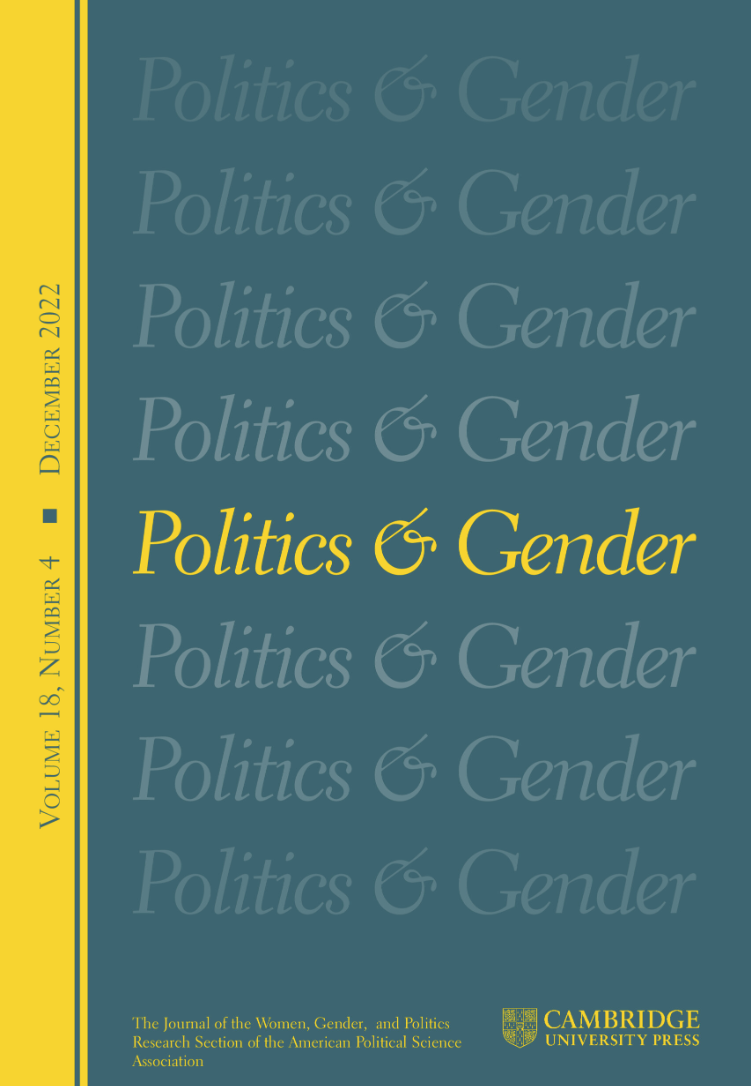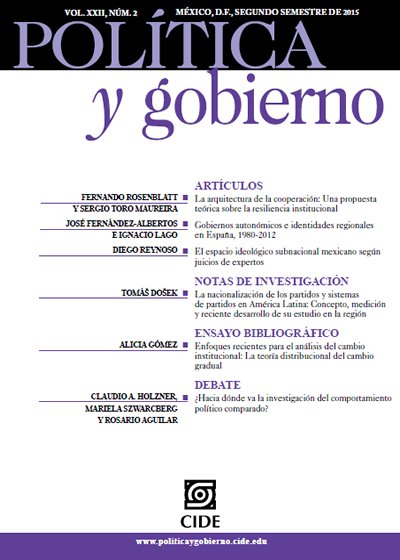Feminist Mobilization and the Abortion Debate in Latin America: Lessons from Argentina. Politics & Gender (co-authored with Mason Moseley). (2021)
When Argentine President Mauricio Macri announced in March 2018 that he supported a “responsible and mature” national debate regarding the decriminalization of abortion, it took many by surprise. In a Catholic country with a center-right government, in which public opinion regarding abortion had hardly moved in decades—why would the abortion debate surface in Argentina when it did? Our answer is grounded in the social movements literature, as we argue that the organizational framework necessary for growing the decriminalization movement was already built by an emergent feminist movement of unprecedented scope and influence: Ni Una Menos. Through expanding the movement’s social justice frame from gender violence to encompass abortion rights, feminist social movements were able to change public opinion and expand the scope of debate, making salient an issue that had long been politically untouchable. We marshal evidence from multiple surveys carried out before, during, and after the abortion debate and in-depth interviews to shed light on the sources of abortion rights movements in unlikely contexts.
"Argentina is about to debate legalizing abortion." Washington Post, “The Monkey Cage,” March 6, 2020 (co-authored with Mason Moseley).
“Argentina legalized abortion. Here’s how it happened and what it means for Latin America.” Washington Post, “The Monkey Cage,” January 18, 2021. (co-authored with Taylor Boas, Mason Moseley, and Amy Erica Smith).
(2020) The Gender Gap in Political Clientelism: Problem-Solving Networks and the Division of Political Work in Argentina. Comparative Political Studies.
The literature on clientelism has recognized the importance of problem-solving networks, but ignored their gendered nature. Contrary to what is often assumed, I argue that female brokers have fewer opportunities to use clientelism for building, enlarging, and sustaining political networks than male brokers. First, I find that female brokers invest heavily in a non-voting constituency because their work centers on children. The gendered division of political work hence reduces women’s chances of building a following. Second, female brokers are less able to distribute resources beyond their political network, diminishing their chances of enlarging the size of their constituency. Third, female brokers have a harder time punishing those who receive benefits but fail to participate in politics, limiting their ability to recruit new followers. Drawing on two decades of fieldwork in Argentina, this paper studies the gender gap in political clientelism and the consequences of the division of political work for political representation. The paper shows how these differences in opportunities, over time, translate into a political underrepresentation of female brokers and an impoverished quality of democracy.
(2018) “Politics and Gender in Buenos Aires.” Journal of Politics in Latin America. (10:3): 3-27.
This paper examines the persistent gender gap in electoral politics at the local level in Buenos Aires, Argentina. I argue that the combination of the division of political work and existing social norms regarding the separation of domestic chores contributes to women’s political underrepresentation at the local level. Studying everyday politics in Buenos Aires, a clear division of political work between men and women was found. Only women were in charge of finding solutions to issues of domestic abuse and violence, and of taking care of children, the pregnant, and senior citizens. Using information from Buenos Aires municipalities, I document the gender gap in elected legislative and executive offices at the local level – as well as in non-elected offices within municipal cabinets. It was also found that the types of political work assigned to female activists and candidates reinforce existing stereotypes of women as mothers of the poor.
(2016) “Gender and Clientelism: Lessons from the Argentine Case.” Revista SAAP. (10:1): 123-140.
This article examines the gender gap in clientelism by studying questions of political participation and representation between male and female brokers. Whereas party brokers have occupied a central role in the literature on clientelistic politics, gender differences have been completely ignored. Using original quantitative and qualitative data gathered over 26 months of fieldwork in several provinces in Argentina, a developing country where clientelism thrives as much as women’s participation in politics, the paper shows how even though female brokers work as much as male brokers, they are, nevertheless, systematically underrepresented politically.
This paper provides an alternative causal mechanism to explain why parties monitor voters. The ability to monitor voters, defined as a clientelistic party’s capacity to convince voters that it can identify the candidate(s) for whom they voted, remains a core assumption in the literature. The underlying logic of the argument is that if clientelistic parties cannot monitor voters, they run the risk of voters taking the goods with one hand and voting with the other. Instead of focusing on commitment, I argue that monitoring makes clientelism work by forcing voters to publicly signal their electoral support before getting to the voting booth. Using empirical evidence from Argentina, this article shows how parties mobilize and monitor voters before elections to avoid the costs of verifying their electoral choices on an individual basis.
The mayors of the Conurbano are as or more important than some governors. Yet, given their importance, it is surprising the lack of academic information about them. The rich body of literature about subnational politics in Political Science has accurately pointed out that in order to understand national politics, we needed to pay attention to the dynamics of political activity below the national level. However, the term subnational is often restricted to describe provincial governments largely ignoring the importance of municipal officials. Studying the political careers of some mayors of the Conurbano, this article seeks to show the contributions and limitations of subnational studies to understand municipal politics. Specifically, the article focuses on the reelection of the mayors of the Conurbano possible until 2016.
This essay advocates for the use of multi-method research in comparative politics. Using an example from distributive politics, the case of political clientelism in new democracies in developing countries, this essay shows the advantages of combining qualitative and quantitative tools to conduct theoretically informed and empirically sound research.
(2014) “Political Parties and Rallies in Latin America” Party Politics, (20:3): 456-466
This paper provides a novel answer to explain the persistence of party rallies in the mass and social media era. I argue that rallies contribute to the organizational structure of clientelistic parties by providing information to different members within and outside the machine. Rallies provide party leaders with information that enables them to monitor brokers’ capacity to mobilize voters, party brokers with an opportunity to display their ability to turn out voters while monitoring voters’ responses, and voters with an opportunity to display their gratitude or fear towards brokers. In addition, rallies provide the opposition with an opportunity to gather information about the electoral strength or weakness of the clientelistic party. Drawing on participant observations, over a 100 interviews, archival research in Argentina and Peru, and secondary literature for the cases of Mexico and Brazil, I explain why political parties conduct rallies and why rallies will continue in the future.
This paper challenges the assumption that parties and candidates with access to material benefits will always distribute goods to low-income voters in exchange for electoral support. I claim that a candidate’s capacity to turn to clientelistic strategies of mobilization is a necessary but insufficient condition to explain his or her decision to use clientelism. Besides having the capacity to use clientelism, candidates have to prefer to use clientelism to mobilize voters. In studying candidates’ capacities and preferences to use clientelism, the paper provides an account of the microfoundations of political clientelism in Argentina. By combining quantitative and qualitative data at the municipal level, I find that the number of pragmatist candidates, who are capable of using clientelism and prefer to turn to these strategies, is almost equaled by the number of idealist candidates who, although capable, prefer not to use clientelism.
Why do some candidates prefer to use clientelistic strategies to mobilize voters while others do not? Building on existing explanations that highlight the importance of voters’ demand for particularistic goods, and parties’ capacities to supply goods and monitor voters, this article focuses on candidates’ political careers. I argue that how candidates begin building a following has important and enduring consequences in the strategies candidates employ in mobilizing voters. Drawing on participant observation, field and archival research, and over 100 in-depth interviews with candidates and activists in Argentine municipalities, I describe the different career paths available to candidates. I find that how candidates begin mobilizing voters to participate in rallies and elections becomes crucial in explaining their preferences to use clientelism. Candidates who receive a salary based upon their ability to mobilize voters, paid party activists, are more likely to use clientelism than candidates who are not paid for their political work, unpaid party activists.
Party brokers have information about voters’ political preferences and their likelihood of turning out to vote, and are able to target clientelistic inducements and monitor voter participation in exchange for voters’ electoral support. However, brokers may also use the clientelistic inducements they receive from bosses to pursue their personal enrichment, at the cost of lost votes for their party. Drawing on an original dataset that traces the political careers of 137 municipal candidates in Argentina, I show how bosses combine information from voter turnout at rallies and elections. By comparing a broker’s ability to mobilize voters, bosses are able to make inferences about reliable brokers who will distribute party goods to voters, and unreliable brokers who will use party goods to pad their own pockets.
Clientelism is a problem-solving network where brokers solve voter problems by providing material and non-material resources in exchange of political support. The literature emphasis on political networks ignores the existence of non-political networks, such as money lending, childcare, and counseling, that also contribute to solve voter problems. This paper uses original data collected by the author in Villa Angel, a densely populated working-class neighborhood located on the outskirts of Buenos Aires City, to show that a broker’s central position in non-political networks explains his or her ability to influence vote choice. Consequently, to understand the effects that problem-solving networks have on political behavior, researchers and policy makers have to pay attention to the overlap and relationships between political and non-political networks.











